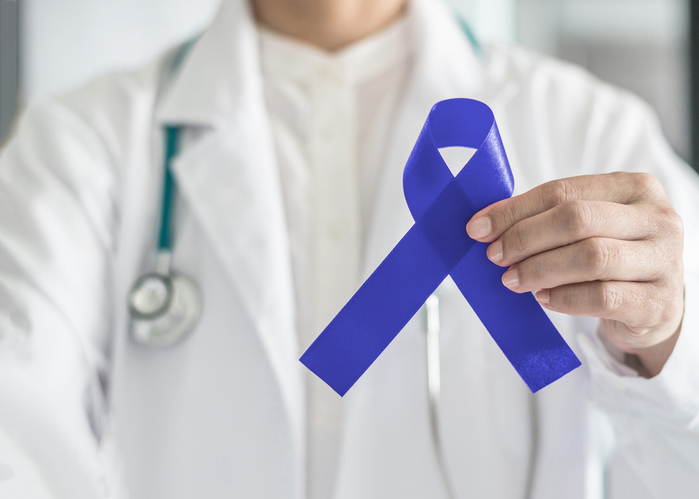Commitment + Clinical Leadership = Better Outcomes

9 Facts About Colon Cancer
Colon Cancer, also known as colorectal cancer, is a type of cancer that starts in the colon or rectum. It is estimated that 151,030 adults will be diagnosed with colon cancer in 2022. Worldwide, it is the third most diagnosed form of cancer.1
Here are nine facts about colon cancer to help you learn more about it, as well as the risks associated with colon cancer.
Colon Cancer is the Third Leading Cause of Cancer-Related Deaths
In the United States, colon cancer is the third leading cause of death. Colon cancer affects both men and women, and the lifetime risk of developing colon cancer is 1 in 23 (4.3%) for men and 1 in 25 (4.0%) for women.2
However, there is some good news: the death rate for colon cancer related deaths has been dropping for decades. One reason for this is colon cancer can be detected in the early stages, which allows doctors to treat it before it develops into other cancers.2
Colon Cancer Was Discovered By Dr. Aldred Warthin
In 1895, Dr. Aldred Warthin found a family he suspected of having colon cancer. In 1913 he published his first report on the subject.3
This paper was the first argument that cancer could be hereditary. It took some time before the medical community accepted his work, mainly until Henry T. Lynch confirmed many of his findings through research.4
Colon Cancer is Largely Undetected at First
When colon cancer begins, many people assume that they may not have it because they don’t experience symptoms. When the symptoms of fatigue, weight loss, changes to bowl habits, and cramps occur, many people will learn that they have colon cancer after a screening.5
It is better to detect colon cancer earlier rather than later because it can help your doctor assist you in finding treatments. It is recommended to have regular colon cancer screenings after the age of 45 because risk increases with older age. The CDC recommends that older adults between the ages of 76-85 talk to their doctor about getting screened and the risks.6
Smoking Increases Colon Cancer Risk
There are many risks associated with smoking, and those who smoke are statistically more likely to get colon cancer. In smokers, risk increases 19% in women and 8% in men. It was also found that the number of years women smoked, the amount of cigarettes smoked, and the earlier the smoking started increased the risk.7
Smoking is a habit that you should work to avoid because it puts you at risk for colon cancer and other health complications. If you believe that you might be at risk for colon cancer due to your smoking history, contact your doctor.
Polyp-Related Colon Cancer Can Be Prevented
While most forms of cancer happen due to a mutation in cells and cannot be stopped, polyp-related colon cancer has been found to be preventable. Polyp-related colon cancer occurs when polyps develop, which are noncancerous mushroom-like growths that eventually lead to colon cancer. Removing these before they cause colon cancer can help save lives and protect people from getting colon cancer.8
Often times, the colon polyps do not cause any symptoms. When they do they can cause rectal bleeding, changes in bowl habits, changes to stool color, and cramps.9
Family History Increases Risk
If you have a direct family member who has colon cancer, then you are more at risk for developing it in your lifetime. 25-30% cases of colon cancer are in those who have relatives who also have it.10
If your family members have colon cancer, talk with a doctor about your risks and check in annually for colon cancer screenings.
Colon Cancer Greatly Affects African Americans
According to the Colorectal Cancer Alliance, African Americans are greatly affected by colon cancer. African Americans are 20% more likely to get colon cancer than other groups and 40% more likely to die from it as well.11
One reason why it is speculated that colon cancer has an impact on the African American community, according to Cancer.org, is that they have a disproportionate access to healthcare systems and treatments. This makes them less able to access screenings and less likely to be able to afford the care that they need.12
Diet is Linked to Colon Cancer
The Continuous Update Project found that those whose diet consisted of processed meat, red meat, and alcoholic drinks had a higher risk of being diagnosed with colon cancer. They found that whole grains, foods with dietary fiber, and dairy products decreased colon cancer risk. Calcium supplements were also linked to lower chances of colon cancer.13
Eating a healthy diet can help protect yourself from colon cancer while giving you nutritional benefits. If you are at risk for developing colon cancer, talk to your doctor about what foods could increase your risk.
Health Conditions Can Increase Risk
There are certain health conditions that increase your risk of colon cancer, including:
- Crohn’s disease
- Familial adenomatous polyposis
- Inflammatory bowel disease (IBM)
- Lynch syndrome
- Type-2 diabetes
- Ulcerative colitis
Spread Awareness About Colon Cancer
Now that you know some facts about colon cancer, it’s important to spread awareness to help others who may be at risk. Get involved by sharing your knowledge with your friends and family, which can help save lives by encouraging them to get regular screenings as part of their annual checkup.
Saber Healthcare is an organization dedicated to providing consultant services to long term care providers. This article is for informational purposes and is not meant to be seen as professional advice. Please consult with a medical expert before relying on the information provided.
Sources
- https://www.cancer.net/cancer-types/colorectal-cancer/statistics#:~:text=These%20numbers%20include%20106%2C180%20new,with%20colorectal%20cancer%20in%202020.
- https://www.cancer.org/cancer/colon-rectal-cancer/about/key-statistics.html
- https://www.ncbi.nlm.nih.gov/pmc/articles/PMC4173047/#:~:text=Aldred%20Warthin%2C%20who%20first%20suspected,cancer)%20over%20100%20years%20ago.
- https://en.wikipedia.org/wiki/Aldred_Scott_Warthin
- https://www.mayoclinic.org/diseases-conditions/colon-cancer/symptoms-causes/syc-20353669
- https://www.cdc.gov/colorectal-cancer/screening/?CDC_AAref_Val=https://www.cdc.gov/cancer/colorectal/basic_info/screening/index.htm
- https://www.webmd.com/colorectal-cancer/news/20130430/women-smokers-more-likely-to-get-colon-cancer-than-men-study#:~:text=The%20risk%20for%20colon%20cancer,risk%20of%20developing%20colon%20cancer.
- https://fascrs.org/patients/diseases-and-conditions/a-z/basic-facts-about-colorectal-cancer
- https://www.mayoclinic.org/diseases-conditions/colon-polyps/symptoms-causes/syc-20352875
- https://fightcolorectalcancer.org/about-colorectal-cancer/general-information/facts-stats/
- https://www.ccalliance.org/colorectal-cancer-information/facts-and-statistics
- https://www.cancer.org/latest-news/colorectal-cancer-rates-higher-in-african-americans-rising-in-younger-people.html
- https://www.wcrf.org/dietandcancer/colorectal-cancer-statistics/
- https://www.nfcr.org/blog/blog9-must-know-facts-colorectal-cancer/
